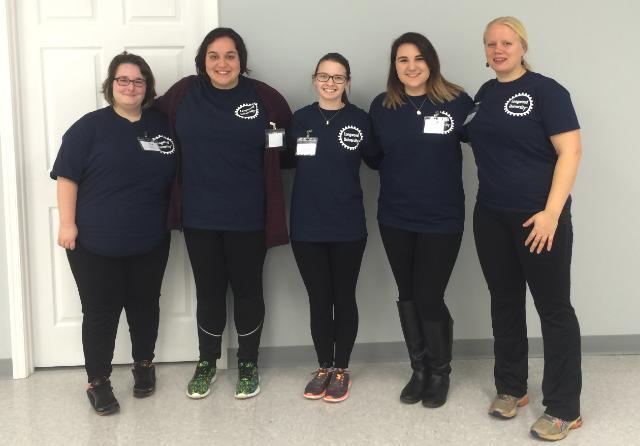Down a gravel road in the woods of a local county one recent evening, Longwood University seniors Victoria Perry and Taylor Hughes interviewed a woman who lives in a shed that lacks heat, water and electricity.
The woman, a domestic violence survivor in her 40s, uses a propane heater to keep warm, buys water at Walmart and dreams of building a house on the property, which she owns. “Her life had crumbled just like dominos, and she can’t stand back up on her feet,” said Hughes, “but she’s doing the best she can in the situation.”
Hughes and Perry were among four members of Longwood’s Sociology Club who searched for people in similar situations when they visited gas stations, fast-food restaurants, laundromats and parks in six nearby counties on the evening of Jan. 25. Along with fellow seniors Taylor Bryant and Lacy Hodges, they were volunteers in an annual homeless census coordinated by STEPS Inc., the regional community action agency.
STEPS partnered for the first time with outside organizations in the “Point In Time Count,” or PIT Count, which is part of a statewide effort to provide a “snapshot” of each region’s homeless population. Data from the count is a factor used in determining grant allocations for programs related to homelessness.
“It was sad but also eye-opening to see that where these people live is so different from where I live,” said Bryant, a sociology major from Poquoson. “We went behind buildings and to dumpsters. We’re told that a lot of homeless people live near dumpsters because that provides access to food, clothes and whatever else is being thrown out.”
Each of the Longwood students served on a team of volunteers that was sent to locate homeless individuals and families in two area counties. Perry and Hughes served on the same team, while Hodges and Bryant were assigned to separate teams.
“It was heartbreaking to interview that woman in the shed, who is so kind. But it sparks a fire—you’ve seen something, and now you want to help. This was a rewarding experience,” said Hughes, a sociology major from Virginia Beach.
But it sparks a fire—you’ve seen something, and now you want to help. This was a rewarding experience.
Taylor Hughes
“We want to help as much as we can, but money is limited, which is why this count is so important,” she added. “A lot of people who need help don’t want to be found, so the homeless population is often overlooked anyway, especially in rural areas like this where they’re harder to count than in urban areas.”
The volunteers, who canvassed from 6 p.m. to midnight, had been provided information ahead of time by local law-enforcement personnel as to where homeless persons might be found. Hodges, who spent part of her night riding with a deputy sheriff, interviewed a man living in an abandoned trailer, and Bryant interviewed a homeless person living at a motel.
The Sociology Club’s involvement was prompted by Perry’s interest in homelessness. Perry, the club’s president, first heard about the count during her internship last semester in STEPS’ housing program, in which Bryant and Hughes are doing internships this semester. The agency seeks to prevent homelessness and responds to the problem by providing emergency shelter and rapidly re-housing residents of shelters. On the night of the PIT Count, those interviewed were offered assistance by STEPS.
“We have more homeless people in this area than you might think,” said Perry, a sociology major from Warrenton.
Because of Perry’s passion, the Sociology Club has focused on homelessness this year, including inviting a speaker from Madeline’s House, a shelter for battered women, to address the club last semester. The group’s adviser, Dr. JoEllen Pederson, assistant professor of sociology, participated in the recent PIT Count.
“Part of STEPS’ funding [for homeless programs] is based on that count, so if they’re not getting an accurate count, they’re not getting adequate funding,” said Pederson, who hopes that Longwood students will continue to volunteer in this effort. “Unfortunately, it’s more difficult to accurately count people in rural areas as opposed to urban areas, where they tend to live in shelters. A lot of them do couch-surfing, going from one relative to another, and don’t get counted, which makes them vulnerable. They can’t always receive the services they need.”
An annual homeless count is required for agencies that receive Virginia Homeless Solutions funding from the Department of Housing and Community Development. This was the fourth year that STEPS has participated in the count.
“The way the grant is structured,” said Amy Beatson, STEPS’ director of planning and resource development, “you ask only for the amount of money you think you’ll need to shelter individuals based on the previous year’s statistics. With last year’s grant, it turns out we needed more shelter money than we thought we would. STEPS has sheltered a lot of homeless people this year.”
Beatson is grateful for the dedication of the Longwood students in general, and Perry in particular, to addressing homelessness. “Victoria is an awesome resource for us,” she said. “Longwood’s involvement in the PIT Count can be attributed to her, and she recruited the two Taylors [Bryant and Hughes]. We continue to have an ongoing relationship with Victoria, who is wonderful.”



Leave a Comment